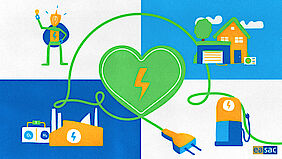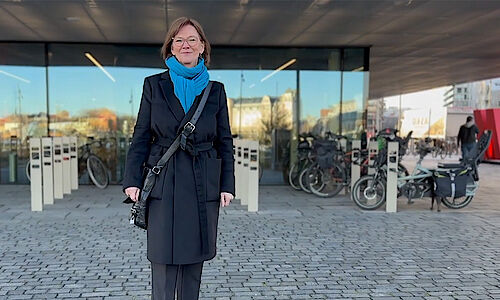News & Academies' activities
“Sustainable Energy Supplies Offer Many Energy Security Benefits”
What has been the most notable development in the EU energy landscape in the past two years?
William Gillett: One of the most notable developments is that the dependency on Russian gas supplies (including LNG) has been reduced from over 40% in 2021 to less than 15% in 2023[1]. That this shift was possible without any major disruptions is an important achievement, as is the fact that price levels have now pretty much returned to pre-invasion levels. What worries me though is that the EU remains 90%[2] dependent on imports for its natural gas, around 42% of which was imported as LNG in 2023[3]. Methane leakage along gas supply chains in third countries is difficult to track and certify.
An important policy development has been that last year Member States of the EU approved a comprehensive revision of the EU Renewable Energy Directive and raised the European target for renewable energies in 2030 from 32% to at least 42.5%, with an ambition to achieve 45%[4].This means almost doubling the current share of renewable energy (18% in 2022).
To meet the EU climate targets, fossil fuels must be phased out by 2050. In which parts of the energy sector is the EU on track?
William Gillett: To completely phase out the use of fossil fuels by 2050 will requires massive investments in renewables in all sectors, including wind, solar and hydro power for electricity, sustainable fuels for transport, scaling up the production of renewable gases including green hydrogen for industry, and promoting heat pumps and district heating for buildings. To integrate more clean electricity, will also require the rapid introduction of energy efficiency measures and demand response systems, together with massive investments in electricity and heat storage, and in reinforcing Europe's power grids with stronger interconnections as well as sustainable back-up power generation. So far, the electricity sector has been a frontrunner with a renewables share of roughly 44% in 2023[5], whereas the heating and cooling sector as well as transport are lagging behind with 25%[6] and less than 10%[7][8]. In transport, we have barely seen any progress over the past three years.
If you were to name just one area in which the EU must strengthen its efforts, which one would that be?
William Gillett: The transformation of the energy sector to net zero by 2050 is a massive task, and it comes with many challenges. But, in addition to mobilising the required financing, one of the biggest challenges is to safeguard energy security throughout the transition. Energy security has many different facets – from meeting the rapidly changing needs of domestic and industrial consumers by delivering sustainable energy supplies from many different sources across the EU, to protecting energy systems from cyber and other malicious attacks. To encourage public acceptance of the energy transition, which is needed to speed up the permitting process, it is important to emphasise that sustainable energy supplies offer many energy security benefits, including reduced dependence on imported fuels, and more decentralized energy systems which reduce the magnitude of energy security risks. This is why EASAC has brought together scientists from 26 European countries to work on the “Security of Sustainable Energy Supplies”. Our report will be published in spring 2025.
[1]https://energy.ec.europa.eu/news/focus-eu-energy-security-and-gas-supplies-2024-02-15_en
[2]https://ec.europa.eu/eurostat/statistics-explained/index.php?title=Natural_gas_supply_statistics#:~:text=Highlights&text=In%202023%2C%20inland%20demand%20of,in%202023%20compared%20with%202022
[3]https://energy.ec.europa.eu/topics/carbon-management-and-fossil-fuels/liquefied-natural-gas_en
[4]https://energy.ec.europa.eu/topics/renewable-energy/renewable-energy-directive-targets-and-rules/renewable-energy-targets_en
[5]https://renewablesnow.com/news/eu-reaches-record-44-renewable-power-in-2023-ember-reports-848043/
[6]https://energy.ec.europa.eu/topics/energy-efficiency/heating-and-cooling_en
[7]https://www.eea.europa.eu/en/analysis/indicators/use-of-renewable-energy-for
[8]https://www.hernieuwbarebrandstoffen.nl/post/eurostat-share-of-renewable-energy-in-transport-2023
back to overview
































